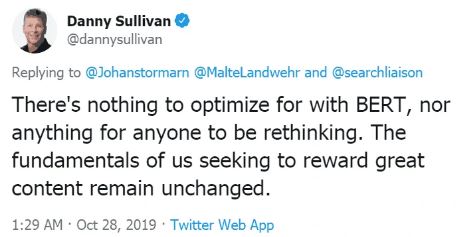
By: Amalia Fowler Oct 21/2019
Google makes updates to its algorithm all the time. This is one of the reasons why it is so important to have individuals well versed in organic optimization on your team or within your agency; if the algorithm makes changes to your site, a skilled SEO can help you bounce back. On rarer occasions, Google makes a major update. This is the case with BERT. No, not the meticulously organized, unibrowed and cuddly Sesame Street character we all know and love, but a Google update that stands for Bidirectional Encoder Representations from Transformers (BERT).

Immediately after the BERT algorithm was announced, articles on what it is and how to handle it popped up on every corner of the web. Some were legitimate, but most were filled with myths or misinformation. As a result, we’ve decided to bring you the facts.
What is BERT?
BERT is a language model, changing how Google understands search queries. It works to understand what humans mean in their queries by learning more about the nuances of context. As humans, we naturally understand context, but a machine typically has more trouble figuring this out.
For example, the word “tie” has many meanings. In some contexts, it is a piece of clothing. In other contexts, it is the act of two or more people crossing the finish line at the same time. It can also be the act of connecting two items with a knot, like tying your shoes. This probably seems obvious to you, but not to a search engine. Previous to BERT, Google had trouble discerning between searches that incorporated words with more than one meaning.
Now, BERT is allowing Google to understand these types of words in their various contexts.
What do I need to do about it?
Are you creating content that is directed to your user intent? Are you doing keyword research and writing informative, clear and helpful articles directed to those who search with those keywords? Are you writing great content specific to your audience? Is your writing clear and do you use words in precise ways?
If the answer to the above questions is yes, then you don’t need to do anything about BERT. BERT is a change on Google’s side that is meant to improve its ability to understand the meaning behind queries. Google said that will affect 1/10 search queries, which is a significant amount, but if you, as a business and advertiser, are already writing for the intent of user queries to begin with, nothing on your side needs to change.
We’re not the only ones saying this. SEO Roundtable published this article about not needing to optimize for BERT specifically and Google’s Danny Sullivan has affirmed that there is nothing to do on the publisher’s side on Twitter.

All the articles saying that you need to take specific BERT related actions are incorrect. There is one caveat to this, however. If you are seeing an impact from BERT, it means that Google has identified that the content on your site is not helpful to a user, and doesn’t match what you’ve tried to optimize for. In essence, if you see a dip from BERT, your content is poorly written and you should look to optimize existing content.
If you see a dip in organic traffic and visibility post-BERT, here’s what to do:
The opportunity that is present with BERT is to bring more traffic to your website by writing content that is focused, organized, and concise – something that your readers already wanted, and that Google is now equipped to contextually understand.
Need help understanding how optimizing your content can help your organic search results? Seen a dip in your traffic since BERT launched and want help navigating the change? Feel free to reach out to us at any point. We’d be happy to help!